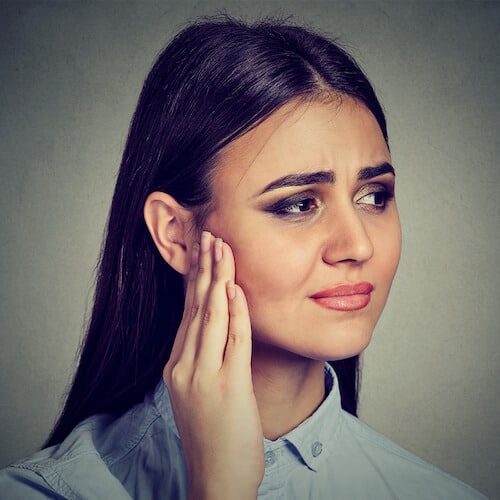Tinnitus Treatment
Definition of Tinnitus
Tinnitus is defined as “the perception of noise or ringing in the ears.” Tinnitus is described as a “perception of noise” because although it sounds extremely real, the ringing or buzzing one hears is not actually a physical sound in one’s environment. Instead, the brain of a person with tinnitus incorrectly perceives these sounds for mostly unknown reasons. Tinnitus itself is not a disease; instead, it is almost always the symptom of another underlying health issue, most commonly hearing loss.

Symptoms of Tinnitus
Prevalence of Tinnitus
Tinnitus is a very common problem in the United States, affecting about 50 million Americans. According to the most recently available data from the CDC, it is estimated that about 15% of the US population has experienced tinnitus in the past year. Of these, 30% of respondents report that their tinnitus is a “moderate” or “very big” problem in their life (source: American Tinnitus Association). Tinnitus is also a prevalent issue amongst our veterans. In fact, tinnitus is the number one most commonly reported injury amongst veterans returning from active duty.
Causes of Tinnitus

Tinnitus Treatment Options
Hearing Aids
Many of today's hearing aids are equipped with powerful, built-in tinnitus treatment options that include therapies and sound masking systems. Because most people with tinnitus also have hearing loss, hearing aids are a great treatment option.
Sound Masking Devices
Sound masking devices are also successful treatment options for people with tinnitus. These devices create sounds that were specifically formulated to help mask the annoying sounds of tinnitus and are most often used to help people sleep at night.
Cognitive Behavioral Therapy
Cognitive behavioral therapy is a successful treatment option for some people as well. Cognitive behavioral therapy helps those with tinnitus better deal with their emotional response to the annoying ringing or buzzing. This type of therapy also helps sufferers direct their focus away from the tinnitus.
Meditation and Other Lifestyle Changes
Meditation and other lifestyle changes have successfully helped alleviate tinnitus for many people. For some, lifestyle changes including increased sleep and decreased alcohol intake have helped to relieve the ringing or buzzing. Similarly, stress reduction can help substantially.
If you have tinnitus, it is important to take a hearing assessment. Almost all cases of tinnitus have hearing loss as the underlying issue, meaning it can likely be alleviated with the use of hearing aids!
Contact Us
